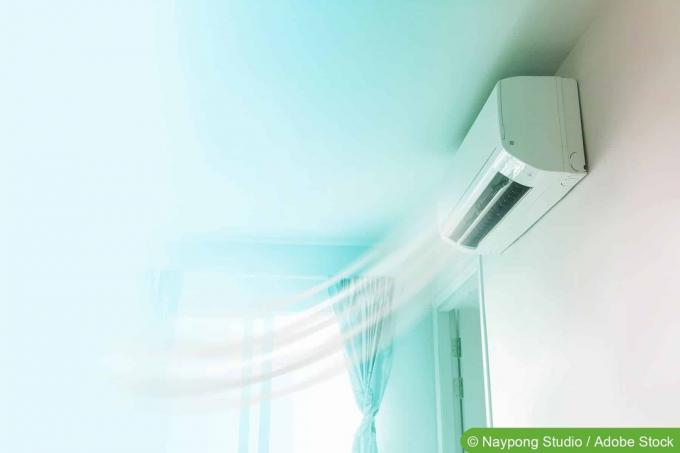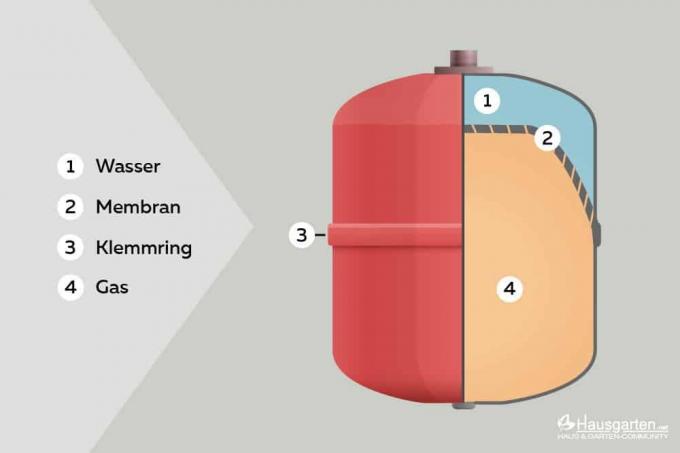

Table of contents
- A matter of pressure
- Pressure setting and pressure change
- pressure calculation
- call specialist
At the latest when the radiators in the apartment no longer get really warm or stay cold, the search for the cause begins. What's going on? The heating is still running and the water temperature is right, as the thermometer shows. It is often overlooked that pressure is also important. In fact, values that are too low can mean that radiators are no longer adequately supplied with warm water. If you notice a reduction in heat output in the apartment, it is highly recommended to check the system pressure and increase it if necessary. However, the following is definitely true: Too high is not good either.
A matter of pressure
In order to understand the importance of the pressure in a heating system, one must first deal with its structure and how it works. Such a system basically consists of several individual components, which together form a system, above all the so-called heating circuit. These components are essentially:
- boiler
- water pump
- heating pipes
- radiator
- return pipes
The boiler heats the water. The water pump transports it via the heating pipes to the individual radiators, where it gives off heat. The cooled water is finally transported back via the return pipes. The cycle begins again. The water pump is therefore of crucial importance in this system. By means of the pressure it generates, the water is pumped to where it is supposed to go. As a rule, altitude meters have to be overcome. If the water pressure is too low, less warm water reaches the radiators, which are furthest away from the pump.
Pressure setting and pressure change

The ideal pressure setting depends on many factors. The size of the building is just as important as the number of radiators that have been installed in it. In general, it can be said that a pressure setting of 1 to 2 bar is sufficient or adequate for a single-family house. is ideal. The exact value is calculated by the heating engineer when installing the system and then preset accordingly. Incidentally, if the value is too high, this often leads to higher heating costs or damage to the system.
But how does a pressure change come about?
Mostly by air penetrating from the outside or air escapes. Although a modern heating system is a closed system, this can very well lead to pressure losses, especially in older systems.
Tip:
If a loss of pressure is detected, the performance of the water pump should be checked by a specialist. It is very common for this to need to be replaced.
pressure calculation
The water pressure can be increased manually at any time. Exactly how this works varies from system to system. The best way to do this is to consult the supplied manual. The much more decisive question, however, is which value should be set. Calculating the ideal pressure is a relatively difficult task that should usually only be carried out by a professional. However, there is a rule of thumb that homeowners can use as a guide. This states that the water pressure should increase by 0.1 bar for every meter of altitude that has to be overcome. This can then be easily calculated.
Example:
- Boiler and water pump in the basement
- the furthest away radiator is ten meters higher
- Calculation: 10 x 0.1 bar = 1 bar
A necessary basic pressure of about 0.3 bar must then be added to this value, which ultimately leads to a value of 1.3 bar. However, all of this information is not set in stone, but only guide values. The problem with this are natural pressure fluctuations in the system, which are perfectly normal. And something else is important: The value determined above represents something like a minimum pressure.
A notice:
If the temperature of the heating system is increased, the pressure will automatically increase due to the greater expansion of the water. Conversely, for a drop in temperature to a drop in pressure.
call specialist
Problems with the heating can usually not be solved so easily. As already mentioned, it is a very complex system where solving one problem can lead to other difficulties. It is therefore not advisable for a layman to lend a hand. The risk of something going wrong and much greater damage as a result is simply too great. To be on the safe side, a specialist should always be consulted. He can not only optimally calculate the pressure, but also find out what the cause of a possible pressure loss is. Since the water pump in particular is a typical wearing part and only one part Professional can be exchanged, you can't get around a heating engineer or an installer anyway hereabouts.
 Home editorial office
Home editorial office
Learn more about heat

Calculate cooling capacity BTU/hr of an air conditioner
If you want to buy an air conditioner, you should know the required performance. This is often given in BTU/h. You can find out what this is all about and how you can easily calculate the cooling capacity of an air conditioning system in our guide.

Combining heat pumps with photovoltaics: experiences
Does it make sense to combine a heat pump with a photovoltaic system? Home builders are right to ask this question, because if you already rely on a sustainable heating system, it can only be right to produce some of the electricity required for operation yourself, or?

Calculate heating expansion tank | Table & Formula
How large an expansion tank in heating systems has to be and what pressure it can generate and withstand depends on various factors. The following tips and the table below show what is important when selecting a pressure equalization tank or expansion tank.

Checking the heating expansion vessel: checklist
The heater's expansion tank serves an important purpose as it absorbs excess water from the system and equalizes the pressure when necessary. In order to prevent defects, it is therefore crucial to carry out regular checks.

Faulty expansion tank: 5 common problems
The expansion tank or the pressure expansion tank is crucial for even and efficient heating. If the expansion tank is defective, for example due to a tear in the membrane, an installer often has to be called in. However, in some cases, you can fix the problem yourself.

Radiator valve is stuck | 4 tips to solve the thermostat
If the heating does not want to warm up, there is a high probability that the radiator valve is stuck. Luckily, you don't need a specialist to make it work again. Here are a few tips on how to undo the part yourself.



